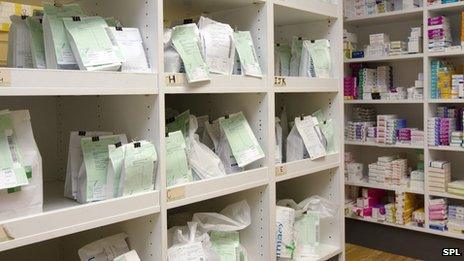Raise prescription charges to £10, think tank urges
- Published

Prescription charges in England should be increased to £10 to fund cash-strapped NHS services, a centre-right think-tank has argued.
Reform says raising the price tag from £7.85, with exemptions for people on low incomes but not necessarily all pensioners, could generate millions of pounds each year.
Around 90% of prescriptions in England are currently dispensed free of charge.
Wales, Scotland and Northern Ireland have scrapped all prescription charges.
The British Medical Association has previously said the current system is "unfair" and wants prescription charges to be scrapped in England.
But with the NHS funding shortfall expected to reach £30bn by 2020, Reform says the time has come to consider higher charges for medicines to help plug this gap - although it accepts that such a move would be unpopular with many.
Thomas Cawston, Research Director at Reform, said: "Few will want to debate higher NHS charges but the funding outlook for the service makes it unavoidable.
"Prescription charges are the easiest route to new revenue, with exemptions for people on low incomes built in."
Prescription charges in England currently raise £450m a year, against a total government spend on prescription services of £7.9 billion.
A simple increase in the level of the charge for prescriptions from £7.85 to £10.00, and in the cost of a Prescription Prepayment Certificate (a way of bulk-buying prescriptions to save patients money in the long term) from £104 to £120, would raise an additional £134m annually, for example.
Or, moving to a French-style system, with a lower prescription charge of £3.00 but exemptions for only a fifth of drugs dispensed, would raise £1.4bn a year, according to Reform.
Other revenue-generating ideas include introducing a £10 flat rate charge for GP consultations or £10 fines for every missed hospital appointment. These would pull in £1.2bn and £55m a year, respectively, Reform estimates.
- Published15 August 2013
- Published6 November 2013